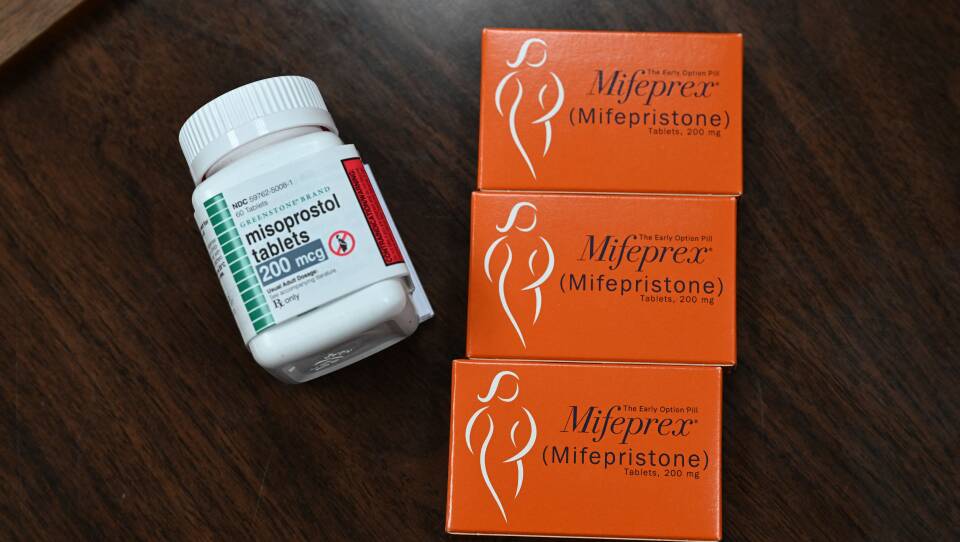Abortion providers say no matter what the federal courts decide, people in Massachusetts will be able to end their pregnancies with medication here.
Dueling federal court rulings out of Texas and Washington on Friday have put legal access to mifepristone — one of two drugs used in medication abortions — in limbo.
The question now is whether mifepristone will continue to be available in Massachusetts, and for how long. Gov. Maura Healey sought to answer that question Monday. She asked UMass Amherst to stock more than a year’s supply of mifepristone, to be distributed to providers throughout the state, and signed an executive action affirming that existing state law protects Massachusetts providers from out-of-state legal action .
Abortion providers and reproductive rights advocates had been anticipating and planning for the Texas decision. All of the providers in Massachusetts that GBH News reached Monday said they would continue to offer medication abortions, even if they have to switch to a different regimen.
That includes Planned Parenthood, which provides half of all abortions in Massachusetts each year.
“Planned Parenthood is prepared to shift to a misoprostol-only regimen should mifepristone become unavailable, but we should not have to,” Danielle Roncari, vice president of medical services Planned Parenthood League of Massachusetts, said at a State House press conference. “In issuing this decision, the Texas judge has willfully ignored more than 20 years of medical evidence, ignored the testimony of medical experts, and ignored patients’ stores about how access to this medication changed or saved their lives.”
More Local News
Medication abortion accounts for more than half of all abortions in the United States. And here in Massachusetts, more than 8,000 women in Massachusetts took mifepristone for an abortion in 2021, state data shows.
A misoprostol-only regimen is slightly less effective than the standard two-drug regimen, ending pregnancies 90% to 93% of the time rather than 97%, according to researcher Ushma Upadhyay at the University of California San Francisco, who studies abortion protocols and access in the United States. Research indicates that taking only misoprostol also causes different and often more severe side effects, such as heavy cramping and prolonged bleeding.
Dr. Tara Kumaraswami, an associate professor of obstetrics and gynecology at UMass Memorial Health, says she’s grateful for Healey’s executive order. UMass plans to keep providing medication abortions with mifepristone, though she and her fellow providers had been preparing to switch to a misoprostol-only regimen, if needed.
“We’re going to see what plays out in the next couple weeks,” she said. “For the most part, people were ready if needed to switch to misoprostol-only. But I think it will be even better if we’re able to continue to use mifepristone.”
The ruling will not go into effect until at least Friday, April 14 — seven days the Texas judge built into his decision for the federal government to appeal . Another federal ruling in Washington state, issued just minutes after the Texas decision, ordered the FDA to preserve the drug’s approval.
“Nothing’s changing immediately,” explained Christie Pitney, a telehealth abortion provider with Forward Midwifery, which practices in Massachusetts and five other states. “For right now, we’re kind of just in a holding period of waiting to see what happens.”
Pitney said she will be consulting with legal experts about whether she would be able to continue providing mifepristone even if its FDA approval is ultimately revoked. If not, she will also provide misoprostol-only abortions.
“There may be a pathway to continue providing it, even if that approval does get revoked,” she said. “I think a lot of legal analysis is going to have to go into that first, so I’m not 100% certain what that will look like.”
How this ruling could affect telehealth and rural patients
Advocates and politicians say that the availability of medication abortion, in particular, is crucial for people in more rural areas who do not have expansive access to health care, like those who live in Western Massachusetts and the Cape and Islands.
Health Imperatives, which serves low-income populations, had not previously been able to directly offer abortion services at its clinics in Hyannis, Martha’s Vineyard, Nantucket, Brockton, New Bedford, Plymouth and Wareham.
But after getting requests to expand services, they made plans to start offering medication abortion at their clinics and via telehealth in July with newly awarded funding from the state .
President and CEO Julia Kehoe told GBH News that the legal cases are “disturbing” for providers, but the clinics will still go ahead with plans to start offering medication abortion on July 1.
“We’re planning on proceeding as we planned,” she said. “But even if the ban goes through at some point, we’re going to continue to start offering services in July with just the [one-drug] regimen, which is safe and effective.”
In 2021, the Food and Drug Administration permanently allowed licensed telemedicine providers to prescribe abortion pills. Advocates celebrated the decision as a monumental step in access for people who live far from clinics, in rural parts of the state or on college campuses.
State Sen. Julian Cyr, who represents Cape Cod, says that medication abortion is a “tremendous tool” to reach some populations.
“When you look at abortion access in Massachusetts, there’s a number of regions that are abortion deserts, including Cape Cod and the islands,” he said. “Particularly in rural communities and geographically the communities that are further away from larger health care facilities, it can be really effective there.”
Kehoe says that for now, she is grateful to work in a state that is moving to protect access.
“If there’s any state to be in, it’s Massachusetts,” she said.










